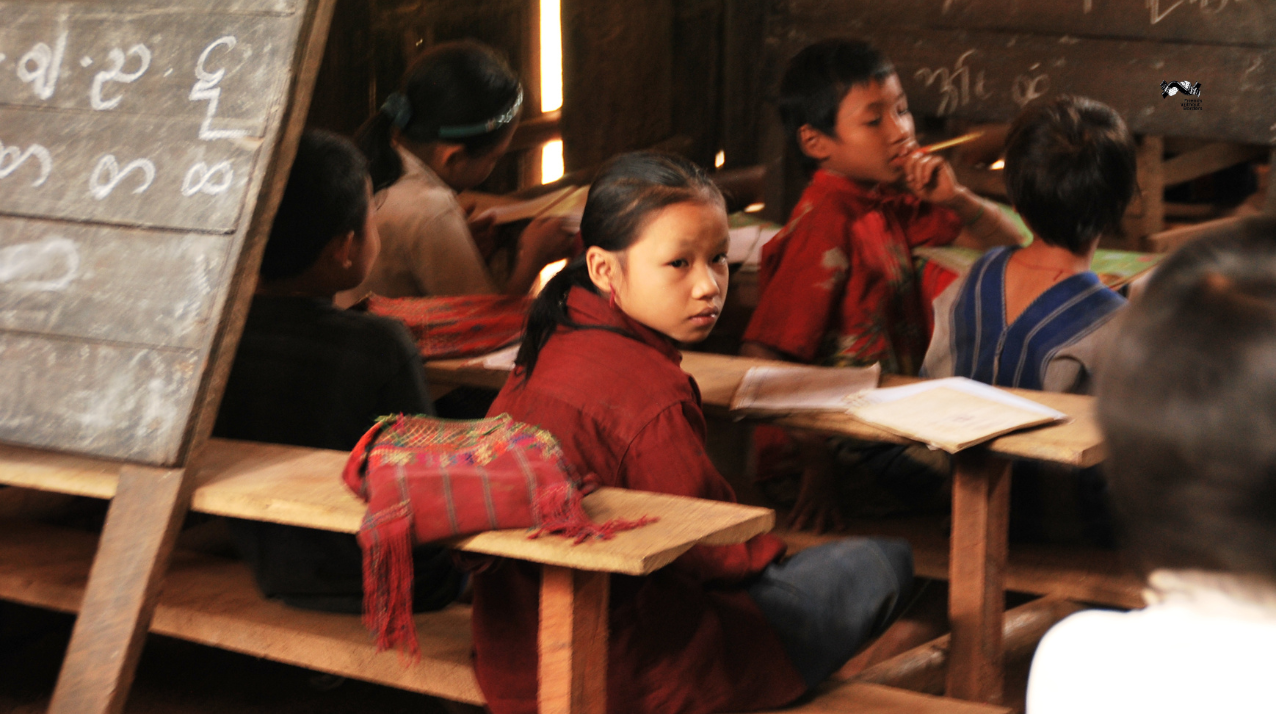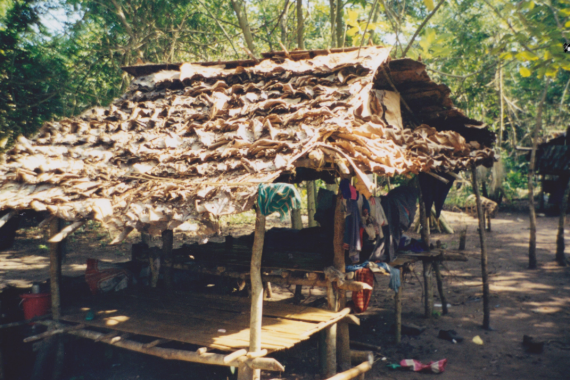เพราะการสู้รบที่ชายแดนประเทศพม่าเมื่อเดือนมิถุนายน 2552 ผมต้องอพยพย้ายถิ่นที่อยู่และหยุดงานสอนหนังสือ โรงเรียนเก่าของผมถูกยึดและแปลงสภาพไปเป็นที่พักทหาร นักเรียนเก่าของผมกระจัดกระจายกันไปในฝั่งไทยและฝั่งพม่า ตัวผมกลับมาอยู่ที่บ้านเพื่อดูแลลูกเล็ก ๆ ทั้งสามอยู่เงียบ ๆ เพื่อนหลายคนทะยอยโทรศัพท์มาหา ไถ่ถามว่าผมทำงานอะไรอยู่ เมื่อตอบไปว่าผมอยู่บ้านช่วยภรรยาเลี้ยงลูก บางคนก็ชวนผมให้เข้าไปทำงานในเมืองที่ให้ค่าตอบแทนสูงกว่าที่ผมเคยได้ บางคนบอกว่าเอ็นจีโอที่ทำงานอยู่แถวชายแดนให้ค่าตอบแทนสูงกว่าการเป็นครูมากไม่รู้กี่สิบเท่า และคุณสมบัติของผมน่าจะพอไปสมัครได้อยู่ และบางคนก็บอกว่าน่าจะถึงเวลาที่ผมต้องตัดสินใจสมัครไปตั้งถิ่นฐานใหม่ในต่างประเทศได้แล้ว เพื่อที่ผมจะได้มีสิทธิเสรีภาพและสร้างอนาคตทางการศึกษาให้ลูก ๆ ของผม
คำเชิญชวนเหล่านี้เย้ายวนนักสำหรับคนที่ต้องพบกับความเปลี่ยนแปลงอันเจ็บปวดและกะทันหันอย่างผม แต่ผมก็ไม่ได้ตัดสินใจ ผมยังไม่รู้สึกหวั่นไหวอะไรเลย ผมได้แต่รอคอยอะไรบางอย่างที่ในขณะนั้นผมเองก็ไม่สามารถพูดเป็นคำพูดได้
แล้ววันหนึ่ง ครูใหญ่ของโรงเรียนสำหรับเด็กอพยพที่อยู่นอกค่ายผู้ลี้ภัยแห่งหนึ่งได้เข้ามาหาผมที่บ้าน เขาบอกว่า “ที่โรงเรียนเรากำลังต้องการครูไปช่วยสอนหนังสือ คุณเป็นครูมาตลอดชีวิต คุณต้องช่วยได้แน่ ๆ คุณจะไปช่วยสอนที่โรงเรียนเราได้ไหม ?” ผมทบทวนถึงปัญหาในครอบครัว ตั้งแต่เราต้องอพยพมา ทุกอย่างก็เปลี่ยนไป ภรรยาผมต้องทำงานหนักมากที่จะเลี้ยงลูกทั้งสามคนและทำงานบ้านต่าง ๆ เพราะไม่มีเพื่อนบ้านและเด็กนักเรียนที่จะช่วยอุ้มลูก เก็บผัก ตักน้ำ การที่ผมอยู่บ้านด้วยจึงทำให้เธอสบายขึ้น ลูก ๆ ได้รับการเอาใจใส่มากขึ้น แต่เงินทองเราก็ไม่มีติดบ้านเลย แม้รายได้ดั้งเดิมจากการเป็นครูของผมจะเป็นเพียงเดือนละ 400 บาทเท่านั้น และที่สำคัญที่สุด ผมรักการสอนหนังสือมาก มันเป็นส่วนหนึ่งของชีวิตผมไปแล้วจนผมนึกไม่มีใจอยากจะไปทำอาชีพอื่น ซึ่งภรรยาของผมเข้าใจตรงนี้ดี เธออนุญาตให้ผมไป ผมขอบคุณเธอ เธอคงรู้ว่าผมจะไม่มีทางเป็นสุขได้เลยถ้าไม่ได้สอนหนังสือ
ผมรอคอยวันเริ่มงานใหม่อย่างใจจดใจจ่อ ผมแทบไม่ได้ถามรายละเอียดอะไรอย่างอื่นกับครูใหญ่ จนกระทั่งถึงวันที่โรงเรียนเปิดเทอม ผมจึงได้นึกขึ้นได้ว่าผมยังไม่รู้เลยว่าผมจะต้องไปอยู่อย่างไรกับใคร และจะเอาอะไรกิน ผมรู้แต่ว่าที่แห่งนั้นเป็นชุมชนคนปกาเกอะญอ อพยพเล็ก ๆ ที่อยู่ในไร่ในนาหมู่บ้านปกาเกอะญอไทย และผมมีหน้าที่จะไปสอนวิชาคณิตศาสตร์ ผมโทรศัพท์ถามครูใหญ่คนนั้นอีกที แล้วเขาก็บอกว่า “เตรียมข้าวสารมาเองด้วยก็ดีนะ เพราะที่โรงเรียนนี้เขาไม่ได้ให้ข้าวครู” ผมจึงเดินทางไปที่นั่นพร้อมข้าวสารถุงใหญ่
เมื่อไปถึงโรงเรียน ผมพบว่าแทนที่จะได้สอนวิชาคณิตศาสตร์ตามที่ได้ตกลงกันไว้ ครูใหญ่กลับขอให้ผมช่วยสอนวิชาภาษาพม่าที่ผมไม่ถนัดนัก แต่ไม่เป็นไร ผมคงต้องพยายามไปจนกว่าเขาจะหาครูสอนภาษาพม่าที่เหมาะสมกว่าผมได้ ชุมชนที่นี่เป็นคนปกาเกอะญอเหมือนในค่ายผู้ลี้ภัยที่ผมเกิดและเติบโตมาก็จริง แต่ทุกอย่างก็แปลกใหม่สำหรับผม พ่อแม่ของนักเรียนทั้งหมดหนีภัยสงครามมาเหมือนคนในค่ายผู้ลี้ภัย แต่พวกเขามาทำงานรับจ้างในไร่นา ไม่ได้รับความช่วยเหลือใด ๆ และไม่มีเวลาดูแลลูกหลานมากนัก ผมพบว่าพวกเขาเป็นอิสระกว่าคนในค่ายที่สามารถทำมาหาเลี้ยงชีพด้วยลำแข้งของตัวเองได้ แต่ความลำบากยากแค้นนั้นไม่ผิดกัน พวกเขาไม่ได้หาเงินได้มากมายหรือร่ำรวยกว่าคนในค่ายเลย แต่ละวันก็กินอยู่กันอย่างจำกัดจำเขี่ยเต็มทน
แทบจะทันทีที่ผมกลับเข้าสู่ชีวิตการเป็นครูใหม่ ผมก็ได้รับทราบว่าแหล่งทุนที่ให้การสนับสนุนด้านการศึกษาสำหรับพวกเราคนชายแดนแห่งหนึ่งได้ยกเลิกการสนับสนุนไป ทำให้เงินทุนด้านการศึกษาที่ไหลเวียนอยู่ลดน้อยลงมากจากที่เคยน้อยอยู่แล้ว ในปีการศึกษา 2554 นี้ โรงเรียนต่าง ๆ ต้องตัดงบประมาณว่าจ้างครู และมีครูหลายคนลาออกไปทำงานอื่นในขณะที่หาครูใหม่ได้ยากยิ่งขึ้น ผมได้ข่าวว่าโรงเรียนเล็ก ๆ บางแห่งต้องปิดตัวไป โดยเฉพาะโรงเรียนในรัฐกะเหรี่ยงและโรงเรียนที่สอนเด็กอพยพนอกค่ายผู้ลี้ภัยแบบที่ผมสอนอยู่ ครูในโรงเรียนของเราได้รับความเดือดร้อนค่อนข้างมากเช่นกัน แต่ทุกคนก็ดูเหมือนกับจะใช้ชีวิตอย่างเป็นสุข ตกเย็นเราก็มีแต่จะพูดคุยหยอกล้อกันเหมือนกับคนในครอบครัวหนึ่งซึ่งไม่มีปัญหาอะไรเลย ไม่มีใครบ่นถึงความทุกข์ยากที่เงินเดือนจะต้องลดลงเหลือ 350 บาทแต่อย่างใด ดูเหมือนเรายังมีกำลังใจในการทำงานอย่างเต็มเปี่ยม
แต่ผ่านไปอีกไม่ถึงเดือน ผมกำลังคุมสอบเด็ก ๆ อยู่ ครูใหญ่ก็เดินเข้ามาบอกว่า “วันนี้กลับบ้านด้วยกันนะ” ผมรู้ทันทีว่าเขาคงมีเรื่องอะไรจะบอกผม และผมสงสัยว่าคงไม่ใช่เรื่องน่าชื่นชมยินดี
ผมขี่มอเตอร์ไซค์ไปส่งครูใหญ่ที่บ้านพักของเขา ระหว่างทางนั้นครูใหญ่ได้บอกว่า “ตอนนี้ถังข้าวสารของครูโรงเรียนเรารั่วแล้วนะ เราคงต้องคุยให้ผู้ปกครองที่เป็นกรรมการโรงเรียนกับพ่อแม่คนอื่น ๆ แล้วว่าจะทำอย่างไร เดือนนี้พวกเราอาจไม่ได้ค่าตอบแทนกันเลยสักคน หรือถ้าได้ผมก็ไม่รู้ว่าจะได้เมื่อไหร่ ถ้าไม่มีอะไรจะกิน เราอาจต้องเก็บกระเป๋ากันแล้วหรือเปล่า ผมก็ไม่รู้เหมือนกัน”
ผมกลับมาที่บ้านพักที่สร้างไว้ติดโรงเรียน ระหว่างอาบน้ำอาบท่าไปก็คิดอยู่ว่าจะทำอย่างไรดี ผมต้องบากหน้าไปคุยกับกรรมการโรงเรียนที่เป็นพ่อแม่นักเรียนจริง ๆ หรือ ตอนผมเด็ก ๆ มีคนบอกผมว่า คนมีการศึกษา คนเป็นครู ไม่มีทางอดตายหรอก แต่เมื่อผมได้เป็นครูขึ้นมาจริง ๆ ผมกลับได้ยินผู้นำชาวปกาเกอะญอคนหนึ่งบอกว่า “พ่อค้าแม่ค้าในค่ายผู้ลี้ภัยน่ะ เขาไม่กล้าให้เงินครูกู้หรอก ถ้าเป็นคนทำงานในโรงพยาบาลหรืออื่น ๆ ก็กล้าให้อยู่ แต่ครูนั้นเงินเดือนน้อยเหลือเกิน ไม่มีทางใช้หนี้ได้แน่ ๆ” ผมฟังแล้วรู้สึกเจ็บใจมาก คนทุกคนเติบโตขึ้นมาก็ผ่านมือครู ผู้นำเราก็ได้รับการอบรมสั่งสอนจากครู แต่เหตุใดจึงไม่มีใครให้คุณค่ากับครูและการศึกษาเล่า ทำไมอาชีพครูจึงต่ำต้อยนัก แล้วตอนนี้เมื่อถังข้าวสารเรารั่วแล้ว จะไปขอยืมขอเชื่อใครเขาก็คงไม่ให้ใช่ไหม หากเขาเห็นครูเดินมาหาก็คงจะแอบหนีไปหลังบ้านทีเดียวละสิ
ผมคิดถึงเมื่อสิบเอ็ดปีก่อนที่ผมเริ่มเป็นครูใหม่ ๆ ผมตัดสินใจกลับเข้าไปในเขตสงครามและอาสาเป็นครูในโรงเรียนแห่งหนึ่งที่อยู่ริมฝั่งแม่น้ำเมย พวกเราห้าคนรวมครูใหญ่อีกหนึ่งคนอยู่กันแบบอาสาสมัครแท้ ๆ ไม่มีการจ่ายค่าตอบแทนใด ๆ แต่ในวัยหนุ่มคะนองเรารู้สึกสนุกมาก เราอยู่กินกันไปแบบนั้นโดยแบกข้าวสารจากบ้านของเราในค่ายผู้ลี้ภัยมาเอง และปลูกผักหาปลาในแม่น้ำกันไปเรื่อย ถ้าไม่มีกินจริง ๆ ชาวบ้านก็มักเอามาแบ่งให้บ้าง วันหนึ่งพวกเรากลับมาถึงบ้านพักและพบว่าป้าครูใหญ่นั่งรออยู่ ตัวครูใหญ่นั้นหายตัวไปไหนเสียแล้วเพราะไม่กล้าอยู่ตอบคำถามของป้าของเขา พวกเราทั้ง 5 คนจึงมีหน้าที่ต้อนรับแขก ซึ่งก็ไม่รู้จะทำอย่างไร เพราะในครัวมีข้าวเหลืออยู่เพียง 2 กระป๋องนมเท่านั้น เราแอบซุบซิบกันว่า ถ้าเช่นนั้นก็จะหุงข้าวทั้งหมดให้แขกกิน และเราห้าคนจะไปขอพึ่งชาวบ้านสักวัน แต่เราจะให้ญาติของเพื่อนเรารู้ไม่ได้เด็ดขาดว่าพวกเราอยู่ที่นี่กันอย่างไร เรากลัวว่าเขาจะเป็นห่วงและไปบอกพ่อแม่ของพวกเราด้วย คืนนั้นพวกเราไปกินข้าวและนอนที่บ้านชาวบ้านเพราะไม่กล้าพบหน้าป้าของเพื่อน รุ่งเช้าก็ไปสอนหนังสือเลย เมื่อกลับมาตอนเย็นแขกของเราก็กลับไปแล้ว และมีข้าวสารกระสอบหนึ่งวางอยู่ด้วย พร้อมกับคำฝากบอกคนแถวนั้นไว้ว่า “ไม่มีข้าวกินทำไมไม่บอก” เรารู้สึกอายแต่ก็รู้สึกขอบคุณเป็นอย่างยิ่ง และคิดว่าถ้าพวกเราตั้งใจทำงาน เราคงจะอยู่ได้ ไม่ว่าอย่างไรก็ตาม
ผมคิดถึงเรื่องราวเก่า ๆ ด้วยรอยยิ้ม เมื่อผมอาบน้ำเสร็จ กำลังคิดว่าจะแต่งตัวไปหากรรมการโรงเรียน หัวหน้ากรรมการโรงเรียนที่เป็นพ่อของนักเรียนผมก็เดินมาหาเสียก่อน เขาถือซองกระดาษสีขาวมาพร้อมกับกระสอบสีขาวสองใบ ผมพูดไม่ออก เขายื่นเงินให้ผม 750 บาทและบอกว่า “ครู วันนี้พวกเราชาวบ้านพูดคุยกันเรื่องปัญหาของโรงเรียน เราได้รวบรวมข้าวสารแต่ละบ้านมาให้ครูทุกคนแบ่งกันกินในกระสอบสองใบนี้ และมีเงินจำนวนเล็ก ๆ น้อย ๆ นี้เป็นเงินช่วยเหลือครูทุกคน แบ่งกันใช้จ่ายไปก่อนนะครู” ผมเกรงใจพวกเขาอย่างมากจนนอนไม่หลับ ชาวบ้านที่นี่หาเช้ากินค่ำ หลายคนมีพอกินไปวัน ๆ เท่านั้น ผมสงสัยว่านี่ผมเป็นผู้มาช่วยเหลือให้เด็ก ๆ เราได้มีการศึกษา หรือมาสร้างความลำบากให้แก่คนที่ที่ลำบากถึงที่สุดอยู่กันแน่นะ แล้วใครกันที่ควรเป็นผู้สนับสนุนค่าใช้จ่ายสำหรับการศึกษาของเด็ก ๆ
ผ่านมาร่วมสองเดือนจนปิดเทอม ปัญหาเรื่องการเงินยังไม่คลี่คลาย แต่ทั้งจำนวนนักเรียนและครูในโรงเรียนเรากลับไม่ได้ลดลง ผมคิดว่าคนที่ทำงานเพียงเพื่อแลกกับค่าตอบแทนย่อมต้องไปหางานใหม่หากค่าตอบแทนลดลง แต่สำหรับคนที่ทำงานด้วยใจ เป้าหมายที่ยิ่งใหญ่ที่สุดของเขาคือบรรลุถึงเส้นชัยและมีเงินเป็นเพียงความต้องการลำดับรอง
ดังนั้นแม้จะเกิดอะไรขึ้น เขาก็จะอดทนและต่อสู้จนถึงที่สุด เปิดเทอมเดือนหน้าผมพร้อมที่จะหอบข้าวสารไปอดทนดูอีกสักตั้ง เพราะผมภูมิใจที่ได้เป็นครู เงินค่าตอบแทนที่น้อยนิดอาจแสดงว่ามีคนให้คุณค่าเราน้อยนิด แต่คุณค่าของเรานั้นย่อมไม่ได้น้อยนิดตามไปด้วยแน่ ผมคิดว่าครูที่ชายแดนอีกจำนวนมากมายคงรู้สึกเหมือนกับผม
Due to the border conflicts in Myanmar in June 2009, I had to relocate and stop teaching. My old school was seized and converted into a military barrack. My former students were scattered across Thailand and Myanmar. I returned home to quietly take care of my three young children. Many friends called to check on me, asking what I was doing. When I answered that I was at home helping my wife raise our kids, some invited me to work in the city, offering higher pay than I used to earn. Some mentioned that NGOs working along the border offered much higher compensation than teaching, and my qualifications would be sufficient to apply. Others suggested it might be time for me to consider emigrating to another country, where I could have rights, freedoms, and a better future for my children’s education.
These invitations were tempting for someone who had faced such painful and sudden changes as I had, but I didn’t decide. I didn’t feel shaken at all. I was waiting for something that I couldn’t articulate at the time.
One day, the headmaster of a school for migrant children outside a refugee camp came to my house. He said, “Our school needs teachers to help teach. You’ve been a teacher all your life; you can definitely help. Can you come and teach at our school?” I reflected on my family’s situation. Since we had to relocate, everything had changed. My wife had to work very hard to take care of our three children and manage household chores, as there were no neighbors or students to help carry the baby, gather vegetables, or fetch water. Having me at home made things easier for her, and the children received more attention. But we had no money at all, even though my original salary as a teacher was only 400 baht per month. Most importantly, I loved teaching; it was a part of my life, and I couldn’t imagine doing anything else. My wife understood this well and allowed me to go. I thanked her, knowing that she understood I wouldn’t be happy if I wasn’t teaching.
I eagerly awaited the start of my new job. I hardly asked the headmaster for any other details until the school term began, realizing I didn’t know how I would live, who I would stay with, or what I would eat. I only knew that it was a small Karen migrant community living on a farm in a Thai Karen village, and my duty was to teach mathematics. I called the headmaster again, and he told me, “It would be good to bring your own rice because the school doesn’t provide food for teachers.” So, I traveled there with a big bag of rice.
When I arrived at the school, instead of teaching mathematics as agreed, the headmaster asked me to teach Burmese, which I wasn’t proficient in. But that was okay; I had to try until they found a more suitable Burmese teacher. The community there was Karen, like in the refugee camp where I was born and raised, but everything was new to me. The parents of all the students had fled the war, like those in the refugee camp, but they worked as laborers on farms without any assistance and had little time to care for their children. I found that they were more independent than those in the camp, making a living on their own, but the hardships were no different. They didn’t earn much more or live wealthier lives than those in the camp, living on the edge every day.
Almost immediately after I resumed my teaching life, I learned that one of the educational funding sources for us border people had withdrawn their support, significantly reducing the already limited educational funds. In the 2011 school year, schools had to cut teacher budgets, and many teachers left to find other jobs while finding new teachers became increasingly difficult. I heard that some small schools had to close, especially those in Karen State and schools for migrant children outside refugee camps like the one where I was teaching. Teachers in our school faced considerable difficulties as well, but everyone seemed to live happily. In the evening, we would chat and joke like a family without any problems. No one complained about the hardship of the reduced salary to 350 baht. It seemed we still had strong morale for our work.
But within less than a month, while I was supervising the students’ exams, the headmaster came in and said, “Let’s go home together today.” I immediately knew he had something to tell me, and I suspected it wasn’t good news.
I rode my motorcycle to drop the headmaster at his house, and along the way, he said, “Our school’s rice barrel is leaking now. We need to discuss with the school committee and parents about what to do. This month, we might not get any compensation, or if we do, I don’t know when. If there’s nothing to eat, we might have to pack up and leave; I’m not sure either.”
I returned to my residence next to the school, thinking about what to do while bathing. Did I really have to face the school committee, who were the students’ parents? When I was young, someone told me that educated people, teachers, would never starve. But as a teacher, I heard a Karen leader say, “Shopkeepers in refugee camps don’t dare lend money to teachers. If it’s hospital workers or others, they would dare, but teachers earn too little to repay the debt.” Hearing this made me feel very frustrated. Everyone grows up through the hands of teachers. Our leaders were educated by teachers. So why does no one value teachers and education? Why is the teaching profession so undervalued? And now that our rice barrel is leaking, who will lend us anything? If they saw a teacher coming, they would probably hide away.
I thought about eleven years ago when I first became a teacher. I decided to go into the war zone and volunteer as a teacher at a school on the banks of the Moei River. Five of us, including the headmaster, were true volunteers without any compensation. In our youthful enthusiasm, we felt it was fun. We lived like that, bringing rice from our homes in the refugee camp and growing vegetables and fishing in the river. If we had nothing to eat, villagers often shared with us. One day, we returned to our residence to find the headmaster’s aunt waiting.
The headmaster had disappeared because he didn’t dare face her. The five of us had to entertain the guest, but we didn’t know what to do because we only had two cans of milk left. We whispered that we would cook all the rice for the guest and ask the villagers for help for a day. But we wouldn’t let the guest know how we lived. We were afraid she would worry and tell our parents. That night, we ate and slept at a villager’s house because we didn’t dare face the guest. The next morning, we went straight to teach. When we returned in the evening, the guest had left, and there was a sack of rice with a message saying, “If you have no rice, why didn’t you say so?” We felt embarrassed but grateful and thought that if we worked hard, we could survive no matter what.
I smiled at the old memories. After bathing, as I was about to get dressed to meet the school committee, the head of the school committee, a parent of one of my students, came to see me first. He brought a white envelope and two white sacks. I was speechless. He handed me 750 baht and said, “Teacher, today we villagers discussed the school’s problems. We collected rice from each household for all the teachers to share in these two sacks, and this small amount of money is to help the teachers. Share it among yourselves for now.” I felt so humbled that I couldn’t sleep.
The villagers here lived hand-to-mouth; many had just enough to eat each day. I wondered if I was here to help provide education for their children or to create more difficulties for those already at their limits. Who should be responsible for supporting the educational expenses for the children?
Nearly two months passed until the end of the term. The financial problems hadn’t been resolved, but the number of students and teachers in our school hadn’t decreased. I think those who work only for compensation would seek new jobs if the pay was reduced. But for those who work with their hearts, their ultimate goal is to reach the finish line, with money being a secondary need.
So, no matter what happens, they will endure and fight to the end. When the term starts next month, I’m ready to bring rice and endure another round because I take pride in being a teacher. The meager compensation may show that we are undervalued, but our true worth isn’t measured by that. I believe many teachers along the border feel the same way as I do.
เสียงชาวบ้านฉบับที่ 54: วันดีวันร้ายวันไหน ผมก็คือครู โดย หลิกรอกระ
เผยแพร่ครั้งแรก 2 พฤศจิกายน 2554
Border Voice #54: Good Days, Bad Days, Any Day – I Am a Teacher by Likrokara
First published on November 2, 2011



![เพื่อนข้างบ้าน: อัพเดทสถานการณ์สิทธิมนุษยชนในเมียนมาร์ประจำสัปดาห์ [18 กุมภาพันธ์ 68]](https://friends-without-borders.org/wp-content/uploads/2025/02/Main-graphic-for-web-4-570x380.png)
